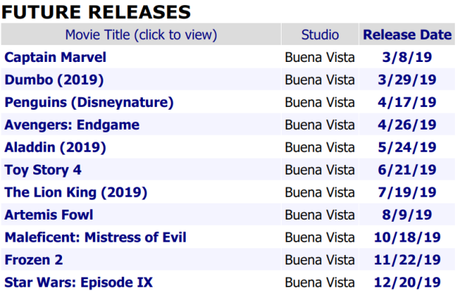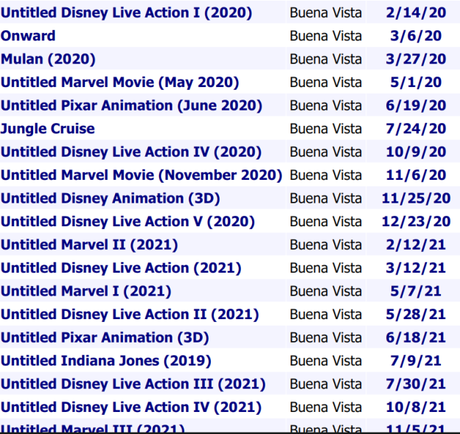At the domestic box office this year, the straits have been so dire all theater owners are now singing the same song: "Help us, Disney, you're our only hope." By the end of the year, however, the rest of the film industry might be left thinking, "Damn, Disney, couldn't you have left anything for us?"
That's because after Disney's surprise move yesterday to make its Maleficent sequel a 2019 release of 2020, as originally planned, we are left looking at one of the most blockbuster-stacked years from any single studio in film history. When Captain Marvel launches tonight, it will be the beginning of a near-nonstop Disney onslaught the likes of which we've never seen before. Titles include (deep breath):

We've seen years in which a studio jampacks its schedule with one notable blockbuster after another, but nothing like this. Apart from the nature documentary Penguins, Disney is rolling out its heavy hitters, with three live-action remakes of animated classics, two sequels to beloved franchises, new Avengers and Star Wars movies, and now a Maleficent sequel.
Remember, this is coming from a studio whose CEO, Bog Iger, famously favors releasing fewer movies per year, preferring to prioritize a handful of blockbusters over any mid-tier performers. Suddenly he has nothing but blockbusters and a lot of them. Should his hit-making machine happen to miss on its one actual risky bet for the year, August's Artemis Fowl, I'm thinking they'll manage.
The only month which currently stands to go untouched by a new Disney release is September. However, by the time we get there, Disney will own Fox meaning that studio's big animation title for September, the Will Smith-led Spies in Disguise, will technically be a Disney movie.

What - and might I add - the fuck is going on here?
Even Disney isn't immune to blockbuster fatigue or cannibalizing itself at the box office as a direct result of bunching too many movies so close to one another. That's to not to say all Disney movies have exactly overlapping audiences, but when you're always playing to the four quadrants a lot of the people who saw your last movie are going to be the same people you want to see your next movie. If you overwhelm them with product, they'll comply if the movies are all really good. If not, you're going to end up with some pretty big misses.
Iger, however, piling so many major movies into 2019 doesn't totally feel like a vote of confidence in their quality. Clearly, they want everything they release to be a hit, but there's a larger force at play here than just selling tickets and dominating market share. As Forbes argues, the real logic behind Disney's go-for-broke strategy is quite simple: the quicker all of these movies hit theaters the quicker they'll be added to Disney+.
The must-succeed streaming service is currently Disney's top priority, and Captain Marvel will be the first theatrical flick to enter the world of streaming not on Netflix but rather on Disney+. It'll be followed by all of the other 2019 releases as well as Fox movies like Dark Phoenix and New Mutants. So, by default, the (potentially) biggest theatrical slate in modern history will in-turn create the biggest streaming premiere slate in recent history as well.
And that's not counting the various original shows ( The Mandalorian, the various MCU originals, High School Musical, etc.) and movies ( Magic Castle, Lady and the Tramp, Noelle, etc.) that will debut sometime within the service's first year.
However, like a small market baseball team that unloads its farm system at the trade deadline in pursuit of a World Series, this leaves the Disney cabin a tad bare going forward in 2020 and 2021. There are more UNTITLED release date holders than there are confirmed movies:

Fox, meanwhile, at least has a Bob's Burgers movie, Murder on the Orient Express sequel, and endless Avatars on the calendar going forward, which will surely plug some holes for Disney. Still, the competition will likely be able to steal back some market share in the years to come.
Not in 2019, though. Disney's strategy isn't quite the equivalent of Netflix's infamous volume-based Original Content strategy where the goal is to simply create enough content to entice subscribers, but that's at least a secondary benefit. It might even work because I'm betting there will be a couple of 2019 Disney movies - like Aladdin and its blue-skinned Will Smith - people decide to pass on, but once those same movies end up on Disney+, eh, they might be worth streaming. You'll have to subscribe to do that, and once you do Iger's 2019 strategy will have paid off.

Grew up obsessing over movies and TV shows. Worked in a video store. Minored in film at college because my college didn't offer a film major. Worked in academia for a while. Have been freelance writing and running this blog since 2013. View all posts by Kelly Konda

